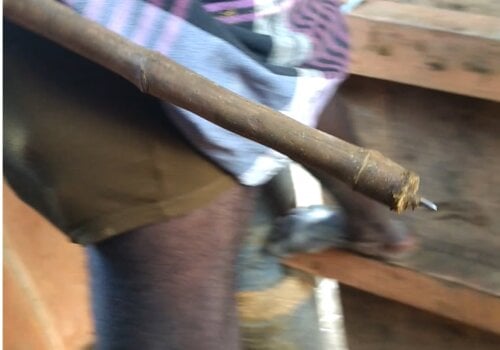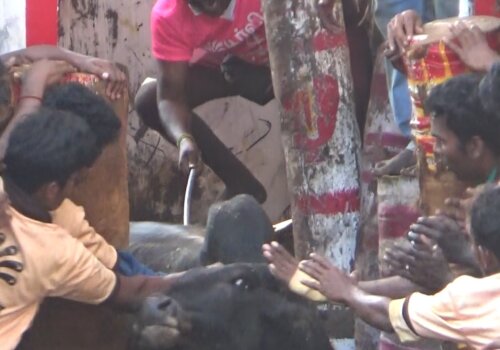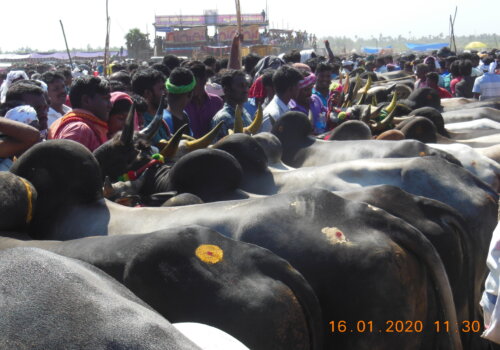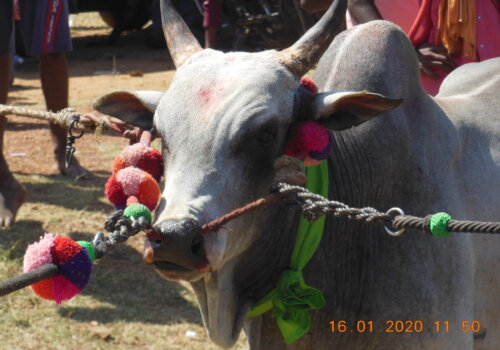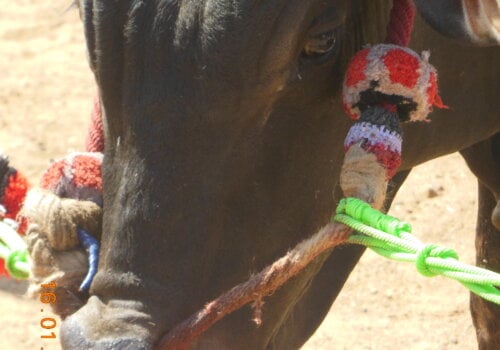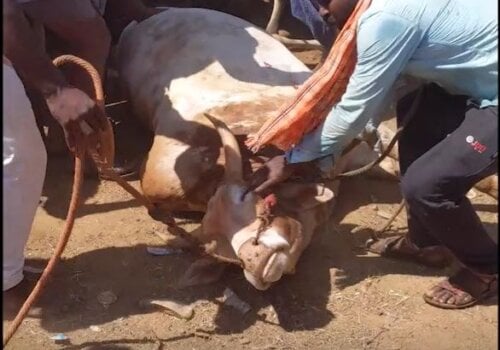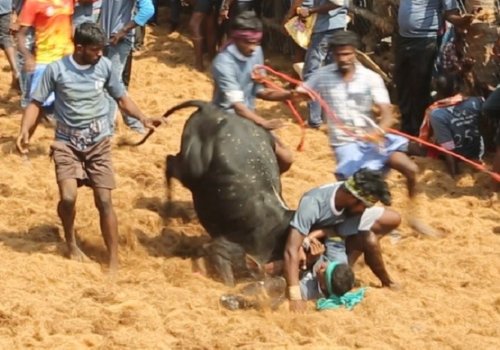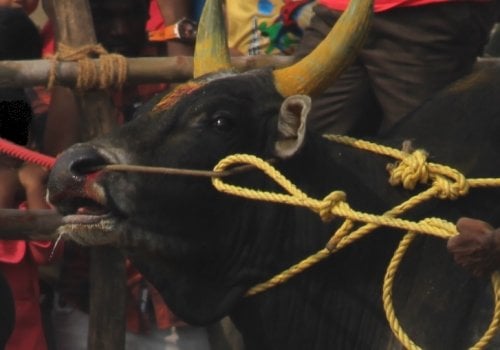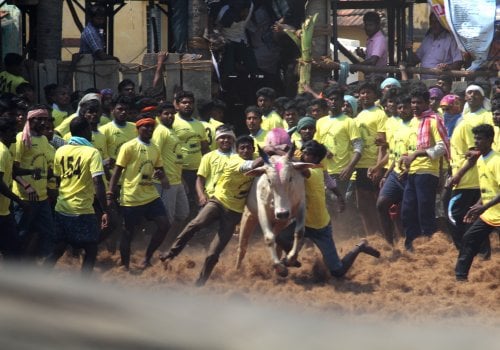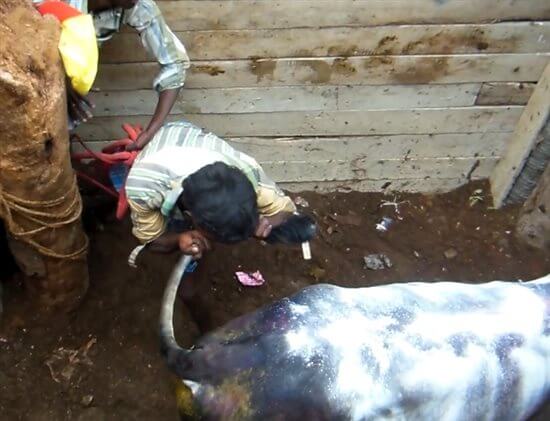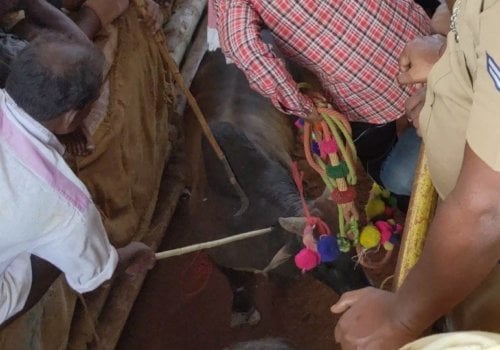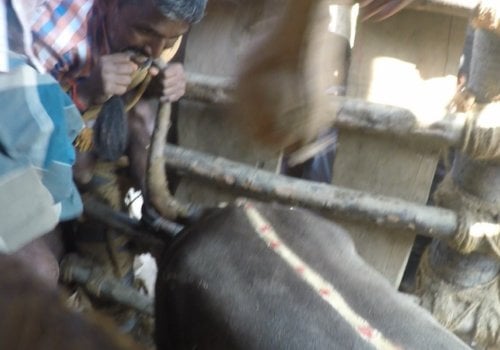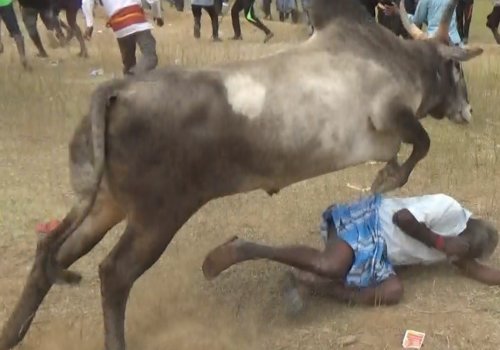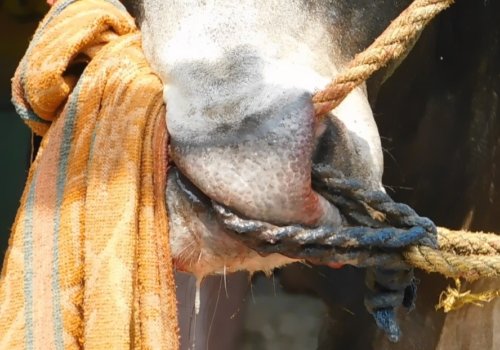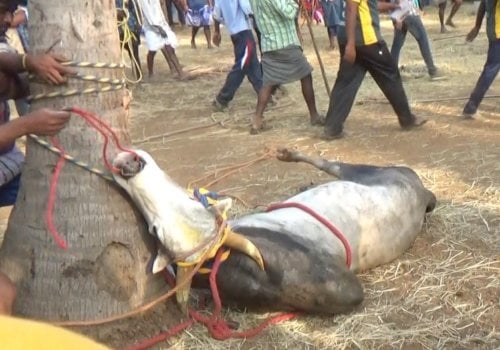From 15 to 19 January, eyewitness investigations conducted at seven jallikattu events organised across four districts in Tamil Nadu documented numerous instances of cruelty to bulls in the form of mental and physical torture. The deliberate infliction of violence and exploitation of bulls’ inherent nervousness by triggering their “fight or flight” response – risking the lives of bulls and humans – demonstrate the wisdom of the Supreme Court’s 2014 ban on jallikattu and the dire need for a permanent ban.
Damning photographic and video evidence from jallikattu events held in Ariyalur, Dindigul, Madurai, and Tiruchirappalli districts shows bulls being beaten, whipped, kicked, and jumped on as well as prodded with metal sickles and nail-tipped wooden sticks and tackled. Exhausted and dehydrated bulls were forced to participate after being made to queue for hours without sufficient shade, rest, water, or food.
State Law Fails to Protect Bulls
Terrorising bulls for entertainment is barbaric. Frenzied organisers and participants bit and twisted their tails and yanked them off their forelimbs and even completely off the ground by their nose ropes, which frequently broke from the tension, causing the animals agonising pain and making their nostrils bleed. Many animals collapsed from exhaustion and dehydration at the events, causing serious wounds and other fatalities.
Jallikattu has devastated animal and human lives this year, even though the season was cut short by the COVID-19 pandemic. During some investigations, panicked bulls were seen fleeing onto village streets, injuring onlookers and even goring some to death. The injuries and deaths caused by jallikattu aren’t always reported by the media, but in just the first two months of 2020, at least 13 humans and six bulls reportedly died during jallikattu events and 570 humans reportedly sustained injuries.
These new investigations prove once again that the ban on jallikattu needs to be reinstated.
Videos
Bulls in Tamil Nadu Need Real Protection
Jallikattu regulations are a joke. State lawmakers have cleared the way for organisers, participants, and spectators to abuse and endanger bulls – and humans – during chaotic events by failing to include any real fines or punishment for violating the Tamil Nadu Prevention of Cruelty to Animals (Conduct of Jallikattu) Rules, 2017.
Eyewitnesses photographed frenzied spectators sneaking into collection yards to abuse bulls, engaging in reckless “parallel jallikattu”, and holding onto bulls’ horns, which all violate regulations. Many bulls forced to participate were not examined by veterinarians, and video footage shows medical authorities in examination camps declaring bulls fit for jallikattu without conducting the mandatory physical medical exams.
Jallikattu is a stain on society. Years of inspections by the Animal Welfare Board of India (AWBI) and investigations by PETA India have demonstrated that jallikattu is in apparent direct violation of Sections 3 and 11 of The Prevention of Cruelty to Animals Act, 1960, which is why the Supreme Court banned it in May 2014.
This latest investigation found that the Prevention of Cruelty to Animals (Tamil Nadu Amendment) Act, 2017; the Tamil Nadu Prevention of Cruelty to Animals (Conduct of Jallikattu) Rules, 2017; and the AWBI’s 2018 guidelines were all violated.
Photos
Deliberately tormenting bulls – who are nervous prey animals – is inhumane. During jallikattu events, participants poke and jab bulls with sticks and sickles and stab, hit, bite, jump on, and tackle them. Many bulls sustain broken bones and severe injuries, collapse from exhaustion and dehydration, and even die. The Supreme Court recognises that using them for spectacles like jallikattu and races – forcing bulls to run for their lives by frightening and hurting them – is inherently cruel, and it rightfully upheld a ban on their use in performances in 2014. Yet the torture and abuse continue to this day, despite a public outcry, animal protection laws, and the threat to both animal and human safety.
Don’t believe it? Check out the photos below:
Injuries and Deaths
Jallikattu events lead to severe injuries, including broken bones, and even to the deaths of humans as well as bulls. Since Tamil Nadu’s state government legalised jallikattu in 2017, at least 22 bulls and 57 humans have reportedly died, and more than 32 bulls and 3,632 humans were reportedly injured in events organised throughout the state. It’s time for the Supreme Court’s ban on jallikattu to be reinstated permanently.
The actual numbers are likely higher. News reports may not cover the eventual human deaths resulting from injuries sustained during the events, and they certainly don’t always cover what bulls endure.
Jallikattu Must End
Tamil Nadu state law cannot negate the fundamental cruelty of deliberately tormenting bulls. Those who are pushed, hit, prodded, or otherwise abused during jallikattu suffer mentally as well as physically. The ban on jallikattu must be reinstated in order to prevent bulls from enduring cruelty and dying as well as to protect humans from injury and death.

